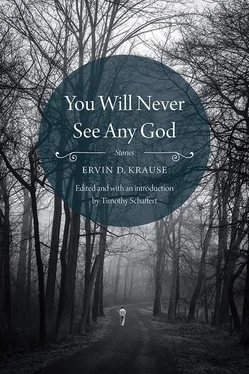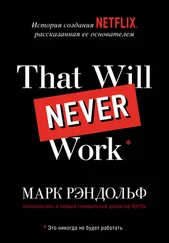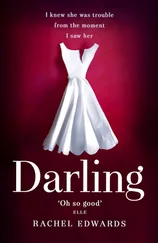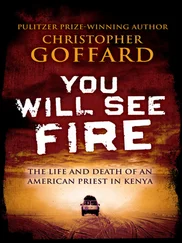I let the engine idle then, and I got down and went around the wheel and stood beside it. My movement did frighten the snake and it raised its head and trailed delicately a couple of feet and stopped again, and its tongue was working very rapidly. I followed it, looking at the brilliant colors on its tubular back, the colors clear and sharp and perfect, in orange and green and brown diamonds the size of a baby’s fist down its back, and the diamonds were set one within the other and interlaced with glistening jet-black. The colors were astonishing, clear and bright, and it was as if the body held a fire of its own, and the colors came through that transparent flesh and skin, vivid and alive and warm. The eyes were clear and black and the slender body was arched slightly. His flat and gracefully tapered head lifted as I looked at him and the black tongue slipped in and out of that solemn mouth.
You beauty, I said, I couldn’t kill you. You are much too beautiful. I had killed snakes before, when I was younger, but there had been no animal like this one, and I knew it was unthinkable that an animal such as that should die. I picked him up, and the length of him arched very carefully and gracefully and only a little wildly, and I could feel the coolness of that radiant, fire-colored body, like splendid ice, and I knew that he had eaten only recently because there were two whole and solid little lumps in the forepart of him, like field mice swallowed whole might make.
The body caressed through my hands like cool satin, and my hands, usually tanned and dark, were pale beside it, and I asked it where the fire colors could come from the coolness of that body. I lowered him so he would not fall and his body slid out onto the cool, newly plowed earth, from between my pale hands. The snake worked away very slowly and delicately and with a gorgeous kind of dignity and beauty, and he carried his head a little above the rolled clods. The sharp, burning colors of his body stood brilliant and plain against the black soil, like a target.
I felt good and satisfied, looking at the snake. It shone in its bright diamond color against the sun-burned stubble and the crumbled black clods of soil and against the paleness of myself. The color and beauty of it were strange and wonderful and somehow alien, too, in that dry and dusty and uncolored field.
I got on the tractor again and I had to watch the plow closely because the field was drawn across the long hillside and even in that good soil there was a danger of rocks. I had my back to the corner of the triangular field that pointed towards the house. The earth was a little heavy and I had to stop once and clean the plowshares because they were not scouring properly, and I did not look back towards the place until I had turned the corner and was plowing across the upper line of the large field, a long way from where I had stopped because of the snake.
I saw it all at a glance. The boy was there at the lower corner of the field, and he was in the plowed earth, stamping with ferocity and a kind of frenzied impatience. Even at that distance, with no sound but the sound of the tractor, I could tell the fierce mark of brutality on the boy. I could see the hunched-up shoulders, the savage determination, the dance of his feet as he ground the snake with his heels, and the pirouette of his arms as he whipped at it with the stick.
Stop it, I shouted, but the lumbering and mighty tractor roared on, above anything I could say. I stopped the tractor and I shouted down to the boy, and I knew he could hear me, for the morning was clear and still, but he did not even hesitate in that brutal, murdering dance. It was no use. I felt myself tremble, thinking of the diamond light of that beauty I had held a few moments before, and I wanted to run down there and halt, if I could, that frenetic pirouette, catch the boy in the moment of his savagery, and save a glimmer, a remnant, of that which I remembered, but I knew it was already too late. I drove the tractor on, not looking down there; I was afraid to look for fear the evil might still be going on. My head began to ache, and the fumes of the tractor began to bother my eyes, and I hated the job suddenly, and I thought, there are only moments when one sees beautiful things, and these are soon crushed, or they vanish. I felt the anger mount within me.
The boy waited at the corner, with the jar of water held up to me in his hands, and the water had grown bubbly in the heat of the morning. I knew the boy well. He was eleven and we had done many things together. He was a beautiful boy, really, with finely spun blonde hair and a smooth and still effeminate face, and his eyelashes were long and dark and brush-like, and his eyes were blue. He waited there and he smiled as the tractor came up, as he would smile on any other day. He was my nephew, my brother’s son, handsome and warm and newly scrubbed, with happiness upon his face and his face resembled my brother’s and mine as well.
I saw then, too, the stake driven straight and hard into the plowed soil, through something there where I had been not long before.
I stopped the tractor and climbed down and the boy came eagerly up to me. “Can I ride around with you?” he asked, as he often did, and I had as often let him be on the tractor beside me. I looked closely at his eyes, and he was already innocent; the killing was already forgotten in that clear mind of his.
“No, you cannot,” I said, pushing aside the water jar he offered to me. I pointed to the splintered, upright stake. “Did you do that?” I asked.
“Yes,” he said, eagerly, beginning a kind of dance of excitement. “I killed a snake; it was a big one.” He tried to take my hand to show me.
“Why did you kill it?”
“Snakes are ugly and bad.”
“This snake was very beautiful. Didn’t you see how beautiful it was?”
“Snakes are ugly,” he said again.
“You saw the colors of it, didn’t you? Have you ever seen anything like it around here?”
“Snakes are ugly and bad, and it might have bitten somebody, and they would have died.”
“You know there are no poisonous snakes in this area. This snake could not harm anything.”
“They eat chickens sometimes,” the boy said. “They are ugly and they eat chickens and I hate snakes.”
“You are talking foolishly,” I said. “You killed it because you wanted to kill it, for no other reason.”
“They’re ugly and I hate them,” the boy insisted. “Nobody likes snakes.”
“It was beautiful,” I said, half to myself.
The boy skipped along beside me, and he was contented with what he had done.
The fire of the colors was gone; there was a contorted ugliness now; the colors of its back were dull and gray-looking, torn and smashed in, and dirty from the boy’s shoes. The beautifully tapered head, so delicate and so cool, had been flattened as if in a vise, and the forked tongue splayed out of the twisted, torn mouth. The snake was hideous, and I remembered, even then, the cool, bright fire of it only a little while before, and I thought perhaps the boy had always seen it dead and hideous like that, and had not even stopped to see the beauty of it in its life.
I wrenched the stake out, that the boy had driven through it in the thickest part of its body, between the colored diamond crystals. I touched it and the coolness, the ice-feeling, was gone, and even then it moved a little, perhaps a tiny spasm of the dead muscles, and I hoped that it was truly dead, so that I would not have to kill it. And then it moved a little more, and I knew the snake was dying, and I would have to kill it there. The boy stood off a few feet and he had the stake again and he was racing innocently in circles, making the buzzing tractor sound with his lips.
I’m sorry, I thought to the snake, for you were beautiful. I took the broken length of it around the tractor and I took one of the wrenches from the tool-kit and I struck its head, not looking at it, to kill it at last, for it could never live.
Читать дальше











